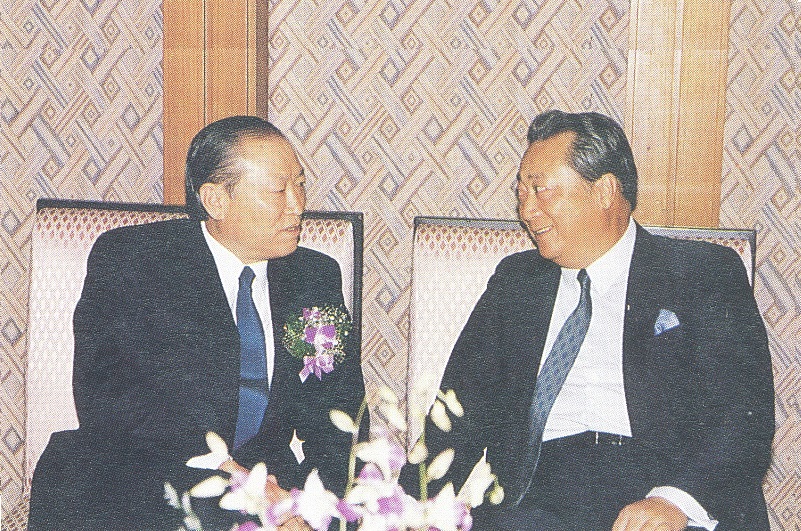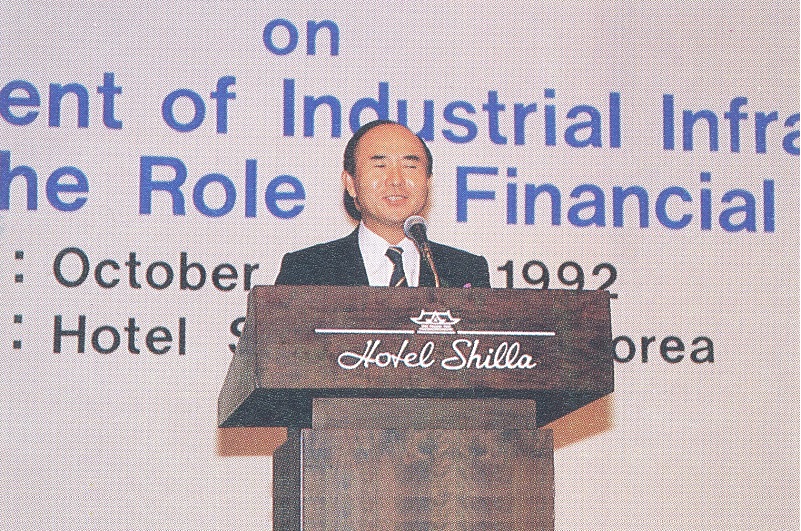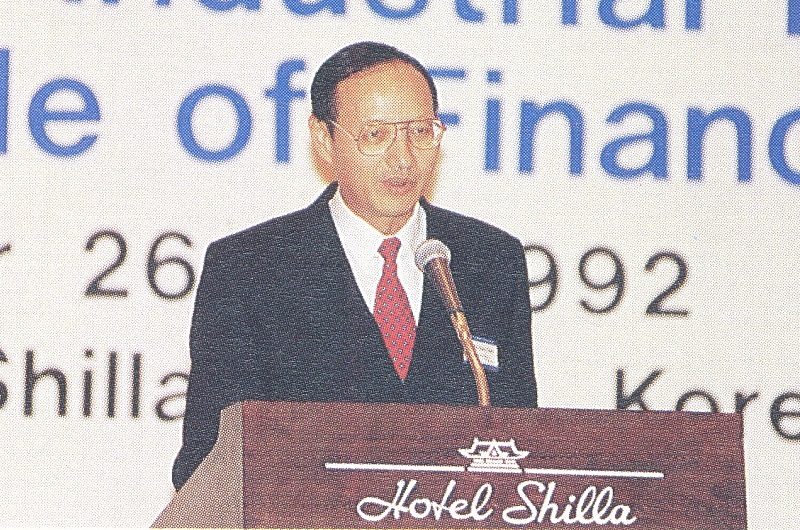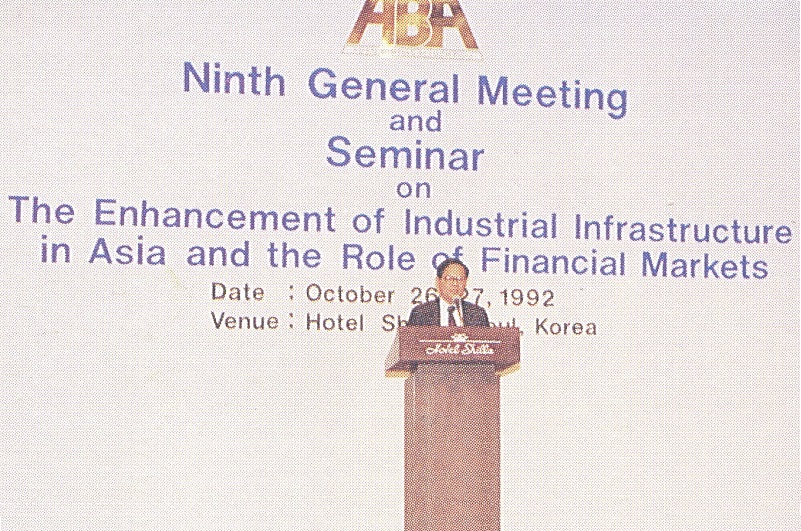The Enhancement of Industrial Infrastructure in Asia and the Role of Financial Markets
26-27 October, 1992
SUMMARY OF THE PROCEEDINGS
1. Some 160 bankers from 23 countries attended the 9th General Meeting and Seminar of the Asian Bankers Association (ABA) held in Seoul, Korea on October 26-27, 1992.
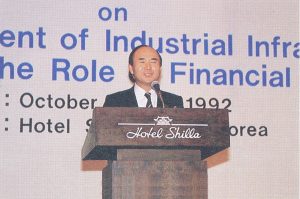 The Seminar
The Seminar
2. Focusing on the theme “The Enhancement of Industrial Infrastructure in Asia and the Role of Financial Markets,” 11 the seminar–held on October 26, 1992–discussed measures to solve the shortage of investment funds needed to ease the infrastructure bottlenecks occurring in many countries in the region.
3. Mr. Tetsuya Horie, President of the Long-Term Credit Bank of Japan and Chairman of ABA, said in his opening remarks that the continued enhancement and development of industrial infrastructure is an essential part of sustaining the strong growth achieved by many Asian countries in recent years. However, the lack of funds for infrastructure investment in a number of countries is constraining this development.
4. In his welcome address, Mr. Hyung-Koo Lee, Governor of the Korean Development Bank, the host organization, urged financial institutions in the region to consolidate their relationships in order to support the real economies of the region. He stressed that the Asian financial markets should lead the way in enhancing industrial infrastructure through mutual cooperation and development.
5. Invited to give the opening address was Honorable Yong-Man Rhee, Minister of Finance of Korea, who stressed that in response to the rapidly changing environment both in the world economic order as well as the financial market conditions, closer cooperation among the Asia-Pacific countries is a precondition for sustaining the region’s economic prosperity. He urged the leading countries in the region to renew their efforts towards further economic cooperation, particularly in the banking and financial fields, and towards the development of their financial markets.
6. In his keynote speech, KDB Governor Hyung-Koo Lee described Korea’s shift from a traditional agricultural society to a highly industrialized economy, and cited the Korean government’s role in this transition process. On behalf of the KDB, he offered to cooperate with other financial institutions in the development of their countries’ industrial infrastructure and to help emerging countries achieve sustained economic growth.
7. Asian Development Bank President Mr. Kimimasa Tarumizu, another keynote speaker at the seminar, recognized that the demand for infrastructure financing in the region would be enormous. The amounts required would strain the budgetary resources of most governments, and commercial banks cannot be expected to fill the gap. Hence, 11innovative approaches, and a willingness by the public and private sector to work together will be essential to supplement government initiatives. At the ADB, we believe that cooperation between the public and private sector using B.O.T.-type arrangements can go a long way towards meeting infrastructure financing needs,” he explained.
8. Representatives from major member banks also presented their country experience and gave proposals for continued infrastructure enhancement in the region.
a. Dr. Nimit Nontapunthawat, Senior Vice President of Bangkok Bank Limited, underscored the Thai authorities efforts to promote equity participation by the public and concessions to private companies in the financing of mass transit systems. He also outlined the steps taken by the Thai government to improve the country’s financial structure to make it adequately answer the fund requirements of both the public and private sectors.
b. Mr. Markus Parmadi, President Director of Indonesia’s Lippo Bank, elaborated on the Indonesian government’s approach toward privatization, joint endeavors, and the development of more sophisticated money and capital markets in its efforts to develop the country’s infrastructure. He said that private participation would reduce the public sector’s financing requirements, increase the efficiency of implementation, encourage greater competition, and enhance the flexibility of supply.
c. Mr. Amirsham bin Abdul Aziz, Senior General Manager, Operations of Malayan Banking Berhad, provided a list of Malaysian projects already privatized and still to be privatized. He urged private bankers not to limit themselves to being merely passive providers of funds, but to increasingly become responsible for funds mobilization as well as financial packaging and risk assumption. He suggested that the financial expertise required for such complex undertakings must be addressed by closer collaboration and exchange of knowledge among the various banks.
d. Mr. Richard J. R. Yen, Managing Director and President of The Shanghai Commercial and Savings Bank, Ltd., said that the ROC government anticipates some problems in the implementation of the US$300-billion projects under its Six-Year Development Plan. These would include the need for enormous government borrowing, difficulties associated with land acquisition, and reluctance of private capital to come forward. To address these problems, he said the government plans to mobilize excess savings, amend relevant laws and regulations to ease the acquisition of land for public projects, securitize debts to promote the diversification of capital market products, and make better use of foreign reserves.
e. Mr. Ng Kee Choe, Executive Vice President of the Development Bank of Singapore, Ltd., described the concept successfully applied in Singapore of using autonomous statutory boards to spearhead infrastructure development. He also cited the savings-consciousness of both the government and the people of Singapore as a key element in the exemplary development of the country’s modern infrastructure. He said the government also recognizes the advantages of privatization in the telecommunications, electricity and gas, port authority and mass transit sectors.
f. Mr. Dong-Soo Choi, Chief Manager of the Seoul Branch of Westpac Banking Corporation, emphasized that a number of government regulatory and structural impediments- widely accepted in Australia as detrimental to the country’s overall national productivity and international competitiveness–will have to be removed before the private and financial sec tors will eagerly jump on the bandwagon. He added that if given the proper incentives, Australian banks will soon gear up to play an increasingly important role.
9. A panel of key personalities also gave their individual commentaries on the seminar theme and on the country reports presented earlier.
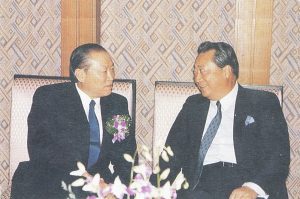 a. Dr. Jeffrey L. S. Koo, Chairman and CEO of the Chinatrust Commercial Bank, cautioned countries in the region not to depend too much on external financing for infrastructure development. He said that if foreign borrowings are out of proportion with the GNP, the financial burden will detract from the benefits of infrastructure enhancement. The main funding source should instead come from domestic savings, he stressed. Dr. Koo nonetheless urged ABA members to help provide capital by forming consortium to extend syndication loans, with government guarantee or World Bank or ADB guarantee. He also urged governments to provide tax exemption privileges or other incentives to make infrastructure projects more attractive to private investments.
a. Dr. Jeffrey L. S. Koo, Chairman and CEO of the Chinatrust Commercial Bank, cautioned countries in the region not to depend too much on external financing for infrastructure development. He said that if foreign borrowings are out of proportion with the GNP, the financial burden will detract from the benefits of infrastructure enhancement. The main funding source should instead come from domestic savings, he stressed. Dr. Koo nonetheless urged ABA members to help provide capital by forming consortium to extend syndication loans, with government guarantee or World Bank or ADB guarantee. He also urged governments to provide tax exemption privileges or other incentives to make infrastructure projects more attractive to private investments.
b. Dr. Mochtar Riady, Chairman of the Lippo Group of Indonesia and incoming Chair man of ABA, said that given the greater demand for infrastructure financing, the private financial sector is becoming increasingly vital in capital formation–a situation that presents unique opportunities for “us to innovate, become more creative, to share new financing techniques among ourselves, and to collectively share in the development of our region.” He added that no one bank or small group of local banks will be sufficiently strong to meet the mega-financing demands that we are thinking about today. These demands will take collaborative efforts of a magnitude that we have not yet experienced. Good starting points for collaboration are the formation of joint ventures and strategic alliances among ourselves.,”
c. Mr. Yasuhiro Kobayashi, Managing Director of the Long- Term Credit Bank of Japan, Ltd., focused on the problems facing privatization pro1ects and the issues to be addressed. He said that in light of the inherent characteristics of infrastructure projects and the risks involved in privatization, it is essential to create a structure that ensures profits on one hand, and avoids, spreads or eliminates risks on the other. He also proposed that governments and international institutions such as the World Bank and the ADB participate in providing financing for infrastructure, and suggested that the ABA members work together to create venues for training and research! to encourage the spread and increasing sophistication of project-financing techniques.
d. Dr. Yoon-Dae Euh, Professor of International Business and Finance, Korea University, and Director, The Korea Development Bank, proposed alternatives for Asian Countries to raise the needed funds for infrastructure, including privatization of government-owned or controlled entities and the participation of international organizations through such schemes as Build-Operate-Transfer (BOT). The former necessitates the development of the domestic capital market and the latter, arrangement of co-financing schemes between local development banks and international financial organizations or foreign governments.
e. Mr. Jeffrey Clarkin, General Manager, Seoul Branch, Australia and New Zealand Banking Group Ltd., shared his thoughts on what the “global balance of payment” might look like in five years time. He said that “Japan’s current account surplus would be smaller, partly because the Japanese consume morel and partly because their government will be continuing its infrastructure improvement. Germany, having digested the reunification, will be back in surplus. These two countries will be the major net suppliers of capital, as they were in the eighties. The USA, under pressure of high interest rates and a weak dollar, will have reduced its deficit substantially. Businesses from rich countries will be far more enthusiastic about investing in developing countries than at home. Developing countries as a whole will be receiving positive net transfers, but the competition between them will be hot. The winners will be those that are most competitive on the world stage.” For their part, financial markets will have the big task of balancing the competing needs of the players in the global markets.
10. In his closing address, Mr. Horie thanked the delegates for their active participation in the General Meeting and Seminar, and cited the host bank, the Korea Development bank, for its important role in making this year’s gathering one of the most successful so far. He summarized the major points taken up during the seminar by saying that in order to break through the shortage of funds for infrastructure, priority must be given to developing and improving money and capital markets, privatizing state-run companies, and privatizing infrastructural projects. The ABA is well positioned to play a central role in fostering the exchange of financial know how and encouraging business cooperation in the private sector within the region, he added.
The 9th General Meeting
11. Mr. Tetsuya Horie chaired the 9th General Meeting held on October 27, 1992. Assisted by Mr. Johnson C. Yen, ABA Secretary- Treasurer, Mr. Horie summarized the activities of ABA over the past year, highlighting the 30°k increase in membership to 142 since the start of his administration (with the special mention of the entry of the Bank of Foreign Trade of Vietnam), the upgrade of ABA Newsletter into a monthly publication, and the joint sponsorship of seminars being arranged with other organizations such as the Manila-based Asian Institute of Management and the Singapore-based Institute of Banking and Finance.
12. Dr. Jeffrey L. S. Koo gave a report on the results of the previous day’s meeting of the Election Committee! which he chaired, regarding the nominations to the Board of Directors. He presented the names of those getting the most number of endorsements, who were subsequently elected unanimously by the members.
13. Mr. Yen announced the assumption of Dr. Mochtar Riady as Chairman. In his acceptance speech, the newly-elected ABA Chairman said that the efforts of Asian countries to intensify and expand economic cooperation among themselves have inevitably led to the emergence of “growth triangles” in Asia. He urged Asian bankers to examine the characteristics of each of these growth triangles as part of their own growth strategies. “There is a definite need for joint eff orts, or synergy, within the membership of the Asian Bankers Association. We must be daring in our vision and at the same time prudent: a difficult balancing act,” he concluded.
14. A plaque of appreciation was presented by Dr. Riady to ougoing Chairman Horie, who urged members to give the new ABA officers 11the same generous and active support that you have given to the outgoing Board and me over the last two years.”
ABA Board of Directors’ Meeting
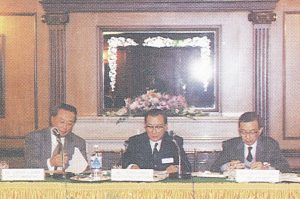 15. The 16th Board of Directors, Meeting was held in the evening of October 25, 1992 and presided by Chairman Mr. Tetsuya Horie. The first item in the agenda was the presentation of the Secretary-Treasurer’s report, which highlighted activities of the Association during the past two years. In the course of the presentation of the report, the Board approved the following:
15. The 16th Board of Directors, Meeting was held in the evening of October 25, 1992 and presided by Chairman Mr. Tetsuya Horie. The first item in the agenda was the presentation of the Secretary-Treasurer’s report, which highlighted activities of the Association during the past two years. In the course of the presentation of the report, the Board approved the following:
- co-sponsorship with the Asian Institute of Management of the Bank Management Course and the advance of US$50,000 to cover costs;
- appropriation of US$10,000 for the purchase of videotapes on banking and finance for training purposes;
- resolution of thanks to Mr. Tetsuya Horie and the LTCB for hosting, in the name of ABA, a reception for the World Bank/IMF delegates in Bangkok in 1991;
- ratification of the application of new members and the acceptance of the withdrawals of membership (except Kyowa Saitama Bank Ltd.);
- the nomination and confirmation of Mr. Tetsuya Horie as the new Chairman of the Election Committee to replace Dr. Amnuay Viravan, who resigned on account of his appointment as Deputy Minister of Thailand;
- the creation of the Planning Committee–·composed of outgoing Chairman, incoming Chairman, and representatives from the LTCB, Lippobank, Chinatrust, DBS and Bank of East Asia–to finalize the proposed Work Program in a later meeting scheduled in January 1993; and
- the presentation of a plaque of appreciation to· Dr. Amnuay Viravan in acknowledgment of the important role he played as Past Chairman and Advisory Council member in the development of ABA.
16. The 17th Board of Directors Meeting was held on October 27, 1992 in two parts. Part I of the Meeting, which was initially presided by Outgoing Chairman Mr. Horie, took up the matter of the election of Vice-Chairman. As the only nominee of the Advisory Council, Mr. David K. P. Li of the Bank of East Asia was unanimously elected to the position. A vote thanks for Mr. Horie was also adopted and the recommended venues for the 1993 and 1994 meetings–Hong Kong and Indonesia, respectively, were approved by the Board. During Part II of the Meeting, now chaired by Incoming Chairman Mr. Mochtar Riady, the following actions were taken:
- Approval of the proposed Program of Work for 1993-1994 subject to further study by the Planning Committee, with focus to be placed on the adoption of more services for the members, as recommended by the Advisory Council, as well as on Mr. Kobayashi’s suggestion to create venues for “training and research to encourage the spread and increasing sophistication of project-financing techniques.”
- Approval of the proposed budget, including the allocation of US$10,000 for the purchase of videotaped training programs.
- The selection of Bank of East Asia as the host tor the 10th General Meeting in Hong Kong and of Lippo Bank for the 11th General Meeting in Indonesia.

